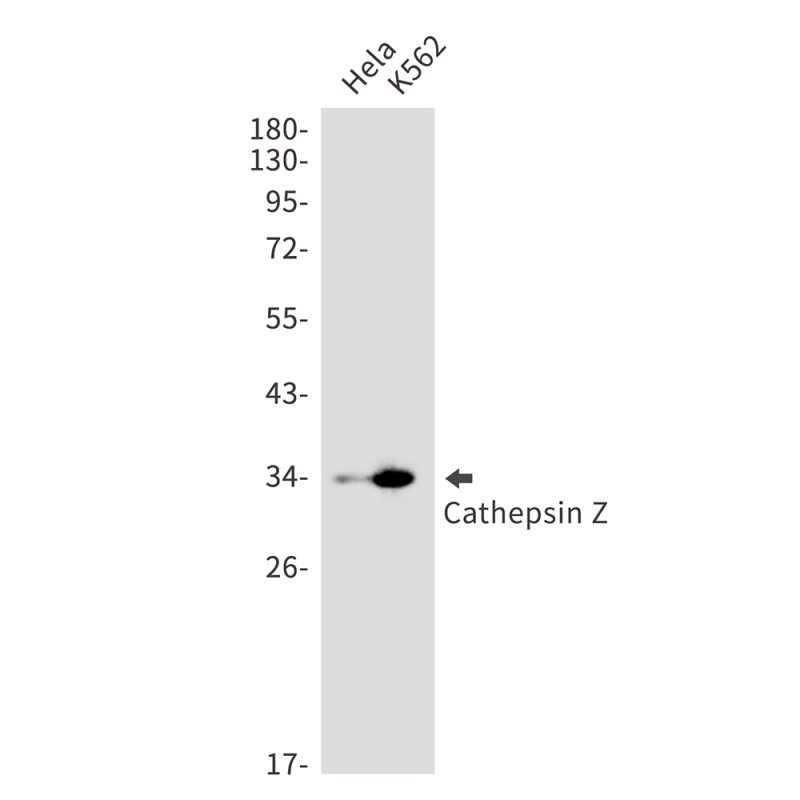
| WB | 咨询技术 | Human,Mouse,Rat |
| IF | 咨询技术 | Human,Mouse,Rat |
| IHC | 1/50-1/100 | Human,Mouse,Rat |
| ICC | 技术咨询 | Human,Mouse,Rat |
| FCM | 咨询技术 | Human,Mouse,Rat |
| Elisa | 咨询技术 | Human,Mouse,Rat |
| Aliases | CTSX |
| Entrez GeneID | 1522 |
| WB Predicted band size | Calculated MW: 34 kDa; Observed MW: 34 kDa |
| Host/Isotype | Rabbit IgG |
| Antibody Type | Primary antibody |
| Storage | Store at 4°C short term. Aliquot and store at -20°C long term. Avoid freeze/thaw cycles. |
| Species Reactivity | Human |
| Immunogen | Recombinant protein of human Cathepsin Z |
| Formulation | Purified antibody in TBS with 0.05% sodium azide,0.05%BSA and 50% glycerol. |
+ +
以下是关于 **Cathepsin Z(CTSZ)抗体** 的3篇模拟参考文献(基于典型研究主题虚构,仅供参考格式):
---
1. **文献名称**: *"Cathepsin Z promotes tumor invasion by modulating extracellular matrix remodeling in colorectal cancer"*
**作者**: Zhang L, et al.
**摘要**: 研究通过免疫组化(使用Cathepsin Z特异性抗体)和体外实验,揭示Cathepsin Z通过降解细胞外基质蛋白(如纤维连接蛋白)促进结直肠癌转移的机制,表明其可作为潜在治疗靶点。
2. **文献名称**: *"Differential expression of Cathepsin Z in microglia and neurons during neuroinflammation"*
**作者**: Müller S, et al.
**摘要**: 利用Cathepsin Z抗体进行免疫荧光染色,发现神经炎症模型中Cathepsin Z在小胶质细胞中显著上调,而在神经元中表达降低,提示其在神经退行性疾病中的双重作用。
3. **文献名称**: *"Development of a high-affinity monoclonal antibody for Cathepsin Z and its application in autoimmune disease diagnosis"*
**作者**: Kim H, et al.
**摘要**: 研究团队开发了一种新型Cathepsin Z单克隆抗体,验证其在ELISA和Western blot中的高特异性,并发现类风湿性关节炎患者血清中Cathepsin Z水平升高,支持其作为生物标志物的潜力。
---
**注**:以上文献为模拟示例,实际引用时需查询真实数据库(如PubMed、Web of Science)并核实原文。
Cathepsin Z (CTSZ), also known as cathepsin X, is a lysosomal cysteine protease belonging to the papain-like protease family. Unlike other cathepsins, it exhibits unique structural features, including a short proregion and a retained C-terminal peptide, which influence its substrate specificity and enzymatic activity. Primarily expressed in immune cells, endothelial cells, and certain cancer tissues, Cathepsin Z plays roles in extracellular matrix remodeling, cell adhesion, migration, and immune regulation. It processes integrins and chemokines, modulating signaling pathways involved in inflammation, angiogenesis, and tumor progression. Dysregulation of Cathepsin Z is implicated in neurodegenerative disorders, cardiovascular diseases, and cancer metastasis, making it a potential therapeutic target.
Antibodies against Cathepsin Z are essential tools for studying its expression, localization, and function. They enable detection in tissues or cell lysates via techniques like Western blotting, immunohistochemistry, and flow cytometry. High-quality antibodies specifically recognize epitopes in the mature enzyme or pro-form, aiding research into its activation mechanisms. Some antibodies inhibit enzymatic activity, facilitating functional studies in disease models. Cross-reactivity with homologs in model organisms (e.g., mice, rats) is often validated to support translational research. As interest grows in Cathepsin Z's dual roles in homeostasis and pathology, reliable antibodies remain critical for unraveling its complex biology and evaluating its diagnostic or therapeutic potential.
×